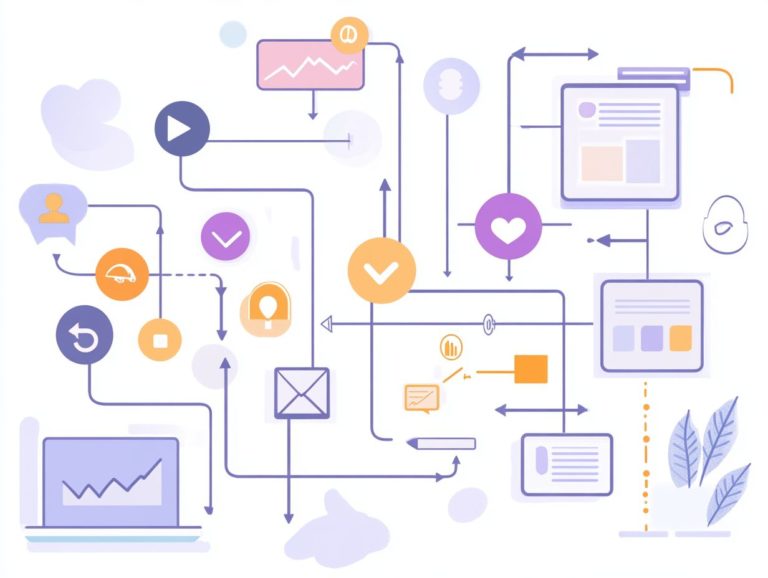What Are the Limitations of CRM Software?
In today s fast-paced business landscape, Customer Relationship Management (CRM) software has become essential for managing customer interactions and optimizing operations.
This article explores the numerous benefits of CRM software, from enhancing customer relationships to boosting sales and improving workflow efficiency. It is important to recognize the limitations that may arise, such as technical challenges and data management issues.
You will find strategies to overcome these hurdles and guidance on selecting the right CRM solution tailored specifically to your needs.
Let s dive into the world of CRM software together, empowering you to make informed decisions for your business.
Contents
- Key Takeaways:
- Benefits of Using CRM Software
- Limitations of CRM Software
- Overcoming Limitations
- Choosing the Right CRM Software
- Frequently Asked Questions
- What Are the Limitations of CRM Software?
- Can CRM Software Handle Large Amounts of Data?
- Do CRM Systems Have Compatibility Issues?
- What Are the Limitations on User Access?
- Can CRM Software Be Customized to Fit Specific Business Needs?
- Are There Any Limitations on Integrating Third-Party Apps?
- Is CRM Software Vulnerable to Cyber Attacks?
Key Takeaways:

CRM software has limitations that can affect its effectiveness, including technical, data, and user limitations. These limitations can hinder businesses from fully utilizing the benefits of CRM software, such as improving customer relationships and streamlining processes. To overcome these limitations, businesses should consider strategies and solutions while carefully choosing the right CRM software based on their specific needs and goals.
What is CRM Software?
CRM software, or Customer Relationship Management software, is an invaluable asset for your business, designed to help you manage customer interactions and optimize your sales process. By centralizing customer data, this software allows your sales team to track customer relationships more effectively and enhance communication with clients, ultimately elevating customer experiences and satisfaction.
Companies like Sunbase are at the forefront of developing CRM systems that integrate various business operations, enabling you to manage leads, automate marketing, and foster user adoption across departments.
These systems typically come equipped with essential features such as:
- Contact and Lead Management: Keep track of all your leads and interactions.
- Robust Analytics: Gain insights into customer behavior and sales performance.
- Reporting Tools: Easily create reports to monitor progress and make informed decisions.
All these features are crucial for knowledge-based decision-making. Functionalities like automated follow-up reminders and personalized communication help keep your sales team organized and responsive. Meanwhile, customer service representatives can efficiently resolve issues using centralized information.
The significance of customer data cannot be overstated, as it drives your strategies for targeting, retention, and relationship-building. By leveraging CRM tools, you not only enhance your operational efficiency but also cultivate meaningful relationships with clients, paving the way for increased loyalty and revenue growth.
Benefits of Using CRM Software
The benefits of using CRM software are extensive, offering the opportunity to significantly enhance sales growth, customer satisfaction, and the overall customer experience.
By automating various marketing campaigns and providing valuable insights into customer behaviors, CRM tools enable you to cultivate lasting relationships with your clients. This, in turn, fosters improved customer loyalty and retention, positioning your business for sustained success.
Improving Customer Relationships and Sales
Improving customer relationships and sales is a primary goal of CRM software. It streamlines your sales process and enhances engagement with your clients.
By effectively leveraging CRM tools, you can track customer interactions, manage leads with ease, and create a personalized experience that truly resonates with each customer s needs.
Utilizing techniques like personalized communication allows you to tailor your messaging based on each customer s history and preferences, deepening those valuable connections.
Implementing feedback loops through surveys and follow-up emails gives your customers a voice, leading to continuous improvements in your product offerings and service.
With an effective CRM system, you can respond promptly to inquiries while anticipating customer needs. This proactive engagement not only boosts satisfaction but also strengthens relationships.
Ultimately, by leveraging these techniques, you ensure your business maintains strong connections, increases customer loyalty, and drives greater sales growth. Start optimizing your CRM today to enhance your customer connections and drive your sales!
Streamlining Business Processes
CRM software is essential for streamlining your business processes. It automates repetitive tasks that can drain your resources and enables seamless project management across your teams.
By providing a centralized hub for all customer data and interactions, CRM systems enhance communication and minimize errors. They also uphold data privacy throughout your operations.
These systems go beyond just managing tasks; they automate your marketing campaigns, allowing for targeted outreach without constant manual intervention. They also include analytical tools that track customer engagement and preferences in real time.
You ll notice improved team collaboration through easily accessible dashboards and reporting features. These tools enable your departments to work together towards common goals. As a result, your business can respond more swiftly to customer needs while maintaining efficiency all while cultivating a culture of accountability and transparency.
This level of efficiency doesn t just streamline operational workflows; it also drives growth and boosts customer satisfaction in the long run.
Limitations of CRM Software

While CRM software offers numerous benefits, it’s essential to recognize its limitations. Consider software constraints, data restrictions, and user challenges these factors can impede the effectiveness of your CRM system.
Such hurdles can cause employees to resist change. This resistance prevents you from fully harnessing the potential of invaluable customer data.
Technical Limitations
Technical limitations of CRM software can present significant challenges, particularly when integrating with your existing systems and addressing data security concerns.
These limitations can disrupt your implementation plan and diminish the overall effectiveness of your CRM system, creating obstacles in securely managing customer data.
You often face compatibility issues when connecting your CRM with essential tools like marketing automation platforms or e-commerce solutions. Data migration can become a complex endeavor, leading to inconsistencies and potential loss of information during the transition.
Security concerns add another layer of complexity. You must ensure adherence to regulations such as GDPR while protecting sensitive client information from breaches. Software bugs can also interfere with daily operations, impacting user experience and causing frustration that may hinder productivity and ROI.
Carefully evaluate these factors before selecting a CRM solution that meets your needs.
Data Limitations
Data limitations in CRM systems can significantly compromise the quality of your customer insights. This raises valid concerns about data privacy and the risk of potential breaches.
Such limitations can impede your ability to manage customer relationships and optimize your sales processes effectively.
Maintaining accurate records poses a considerable challenge, especially with issues like data duplication that can distort customer profiles. Inaccurate data disrupts interactions and erodes trust, as clients grow wary of companies that mishandle their information.
The constantly evolving landscape of data privacy regulations, such as GDPR and CCPA, adds another layer of complexity. You must integrate compliance into your data management strategies. Act now to comply with data regulations like GDPR to avoid hefty fines!
Neglecting to adapt to these regulations can result in serious reputational damage, necessitating significant investments in robust data management practices to cultivate and maintain customer trust and loyalty.
User Limitations
User limitations in CRM software often arise from insufficient training and a reluctance to embrace change among employees. This situation can significantly hinder user adoption rates and lead to a cycle of frustration.
When employees feel overwhelmed by advanced features, they may revert to outdated methods, ultimately stifling engagement. By investing in comprehensive training programs, organizations can confront these challenges directly, cultivating a culture of acceptance and adaptability.
Training equips users to navigate the CRM with confidence, alleviating anxiety around technological shifts and enhancing their overall proficiency. As employees become more adept, their hesitance fades, paving the way for meaningful engagement with the system.
This transformation not only elevates productivity but also maximizes the returns on CRM investments. It enables more knowledge-based decision-making and enriches customer interactions.
Overcoming Limitations
Overcoming the limitations of CRM software demands strategic solutions that prioritize user adoption, thorough employee training, and addressing merging with existing systems.
Implementing these effective strategies unlocks the full potential of your CRM systems, ultimately elevating the overall customer experience and driving your business forward.
Strategies and Solutions

Implementing effective strategies and solutions is essential for overcoming CRM software limitations, particularly in employee training and user adoption. By focusing on these critical areas, you can enhance integration and ensure that your CRM tools are fully utilized.
Develop tailored training programs that accommodate various learning styles. Consider offering workshops, one-on-one coaching, and interactive e-learning modules. These approaches can significantly boost understanding and engagement.
Fostering a culture of peer-to-peer knowledge sharing is another powerful method for creating a collaborative learning environment. The importance of addressing integration needs cannot be underestimated; ensuring that your CRM seamlessly interfaces with existing systems streamlines workflows and reduces resistance to change.
Organizations that successfully integrated their CRM with project management tools have reported a remarkable 30% increase in user satisfaction. This underscores the critical role of seamless collaboration in today s tech landscape.
Choosing the Right CRM Software
Choosing the right CRM software requires a discerning approach, as various factors can profoundly influence your implementation strategy.
Considerations such as data privacy, user adoption, and integration needs are essential in this process. By meticulously assessing these elements, you can select a CRM system that aligns with your strategic goals and enhances your customer relationship management objectives.
Factors to Consider
When choosing CRM software, consider a variety of factors, including implementation costs, user adoption rates, and how well the system meets your customer needs. Data security is paramount; protecting sensitive information during business operations should never be an afterthought.
Scalability is essential as well. Your business will evolve, and your CRM system should grow alongside it.
An intuitive user interface plays a crucial role in user adoption rates. If your team finds the software clunky or confusing, they might resist using it, which could ultimately stifle productivity.
The ability to connect with other tools is vital. This feature allows you to streamline processes and maintain a cohesive workflow across your organization.
Finally, don t overlook customer support and training offerings. The level of assistance available post-purchase can significantly influence how quickly your teams adapt to the new system. Assess this aspect before making a decision.
Frequently Asked Questions
Here are some common questions about CRM software limitations.
What Are the Limitations of CRM Software?
CRM software has several limitations that organizations must consider before implementation. To better understand these issues, it’s important to explore the most common CRM software challenges. Some of these limitations include:
Ready to improve your CRM experience? Contact us today!
Can CRM Software Handle Large Amounts of Data?

CRM software is designed to manage customer data. However, it can have limitations when handling large amounts of data.
This may lead to system slowdowns or crashes, making it difficult to access important information.
Do CRM Systems Have Compatibility Issues?
Businesses and their data can be very diverse. As a result, CRM software might have issues connecting with certain systems or applications.
This can create problems combining data, which reduces the software’s effectiveness.
What Are the Limitations on User Access?
Most CRM software has limitations on the number of users who can access the system at the same time. This can cause delays and might prevent employees from accessing the system when they need to.
Can CRM Software Be Customized to Fit Specific Business Needs?
CRM software offers many features. However, it might not meet all the unique needs of a business.
Customization options, or features that allow changes to the software, can be limited.
Are There Any Limitations on Integrating Third-Party Apps?
CRM software might also have limitations on integrating third-party applications. This can slow down business processes and lead to extra costs for acquiring and integrating other software.
Is CRM Software Vulnerable to Cyber Attacks?
CRM systems can have vulnerabilities that cyber attacks can exploit. This can put sensitive customer data at serious risk!






